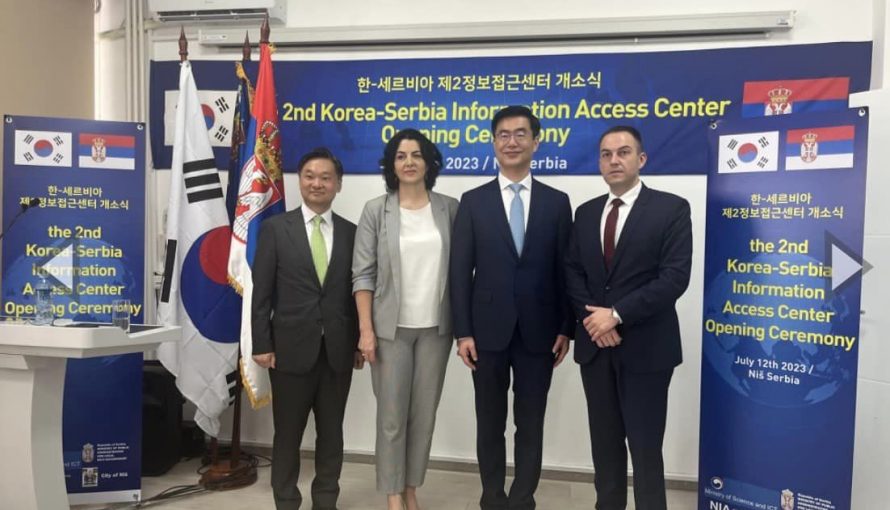
Another Serbian-Korean Information Access (SKIP) center was officially opened today in Niš, with the financial support of the National Information Society Agency for of the Republic of Korea, making Serbia the only country in the region that has two such centers for free training of citizens in the field of information – communication technologies.
The opening of the new SKIP center in Niš represents a kind of recognition of the Republic of Korea to the Republic of Serbia for the results achieved in the domain of the IT industry and digitalization of public administration, and an additional indicator of successful cooperation between the two countries. The functioning of this center, equipped with the most modern equipment and computers, will contribute to raising the level of electronic services in the city of Niš, but also in the entire Nišava district.
State Secretary of the Ministry of Public Administration and Local Self-Government Čedomir Rakić pointed out that it is particularly important that this center will enable citizens in this part of Serbia to be additionally empowered to use electronic administration services, as well as to receive better and faster services.
“In accordance with the determination of the Government of the Republic of Serbia to modernize public administration, we focused on strategic planning of the development of electronic administration and its services, strengthening the legal framework and strengthening capacities.” At the same time, we continuously support and encourage city and municipal administrations to provide better and better services to citizens and the economy, that is, we work every day to make public administration grow into a service dedicated to the needs of citizens,” said Rakić.
Ambassador of the Republic of Korea in Serbia Jeong Lee emphasized that the SKIP center is a representative project of cooperation between Korea and Serbia in the sector of information and communication technologies, which aims to improve the quality of life of citizens by enabling better access to information. The opening of the second such center in Serbia indicates the close relations between the two countries, Ambassador Lee explained, and expressed the hope that its functioning will contribute to the improvement of citizens’ skills in the use of new technologies, as well as the digitization of society, which has been promoted as the primary task of the Serbian government.
The Vice President of the National Information Society Agency of the Republic of Korea, Jeho Lee, pointed out that the Niš SKIP center is equipped with the latest generation equipment, which, among other things, includes educational drones for experimental learning and special assistive devices for people with disabilities. He expressed his belief that Niš, which has always been at the crossroads of trade routes and civilizations, will also become the seat of innovation in the digital world, and that this center will help overcome the digital divide and respond to the needs of marginalized social groups.
The Mayor of Niš, Dragana Sotirovski, pointed out that, in light of the public administration reform and its goals, as well as increasing the efficiency and effectiveness of public services, Niš was recognized as the best place to establish a second such center in Serbia, which will primarily work on digital literacy of citizens. She added that the participants of the training in this training center will have the opportunity to master the use of digital tools in everyday life, but also to participate in advanced courses, and emphasized that the equipment is adapted to the blind, visually impaired and people with hearing problems.
Let us be reminded that the first such center, within the Ministry of Public Administration and Local Self-Government, was opened in Belgrade at the end of 2017 and in less than six years of operation, nearly 4,000 free trainings were conducted and nearly 80,000 citizens were trained. In 2021, the Skip Center in Belgrade received the Golden Plaque as the most successful center of this type in the world, out of a total of 55 that function thanks to the support of the Republic of Korea.




